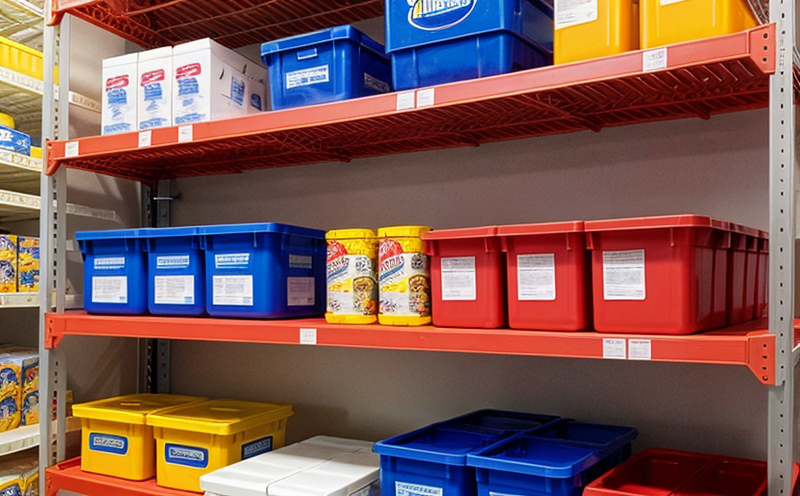ISO 71426 Oxidative Stability Testing in Cooking Oils
The ISO 71426 standard provides a rigorous framework for assessing the oxidative stability of cooking oils, ensuring they meet high standards of quality and safety. This testing method is critical for manufacturers who want to ensure their products are stable during storage and use, thereby protecting consumers from potential health risks associated with rancid or oxidized fats.
Understanding oxidative stability involves recognizing how quickly a fat or oil undergoes oxidation processes that can lead to the formation of free radicals. These changes not only affect the taste and aroma but also impact the nutritional value and safety of cooking oils. By adhering to ISO 71426, laboratories ensure that they are using the most up-to-date and internationally recognized protocols for this testing.
The test protocol involves subjecting samples of cooking oil to controlled oxidative conditions in a laboratory setting. This process simulates real-world storage environments where fats can degrade over time due to exposure to air, light, and heat. The primary goal is to determine the onset of rancidity by measuring key indicators such as peroxide value (PV), anisidine value (AV), and other parameters that indicate lipid oxidation.
During this testing process, it's essential to meticulously prepare samples according to strict guidelines outlined in ISO 71426. This includes ensuring the integrity of the specimen by minimizing contact with oxygen and light during handling and analysis. The use of precise analytical instruments like gas chromatography-mass spectrometry (GC-MS) or Fourier transform infrared spectroscopy (FTIR) further enhances accuracy.
The results from these tests provide valuable insights into the shelf life of cooking oils, allowing manufacturers to make informed decisions about packaging, storage conditions, and marketing strategies. For instance, understanding the oxidative stability helps in optimizing the selection of antioxidants that can extend shelf life without compromising safety or efficacy.
In addition to enhancing product quality, compliance with ISO 71426 also contributes significantly to regulatory requirements across various countries. This standardization ensures consistency in testing methodologies and reporting, which is crucial for international trade and compliance with global health and safety regulations.
For businesses involved in food production or distribution, investing in such tests can lead to substantial cost savings by reducing waste through improved product longevity. Moreover, it fosters greater consumer trust by delivering consistently high-quality products that meet stringent standards of freshness and safety.
Why Choose This Test
The ISO 71426 oxidative stability test is highly beneficial for several reasons:
- Enhanced Product Quality: Ensures cooking oils remain fresh and safe for extended periods, enhancing overall product quality.
- Regulatory Compliance: Helps businesses comply with international standards set by organizations like ISO, ensuring seamless trade across borders.
- Sustained Shelf Life: Provides accurate data on how long a particular type of cooking oil can be stored before it starts to deteriorate, enabling better inventory management and reduced waste.
- Informed Decision Making: Offers detailed insights into the performance of different types of cooking oils under various conditions, aiding in research and development efforts aimed at creating longer-lasting products.
- Consumer Trust: Demonstrates a commitment to delivering safe and high-quality products, which can significantly boost brand reputation among consumers.
- Economic Benefits: By minimizing losses due to spoilage and extending product life, businesses can save money on raw materials while improving profitability.
These benefits underscore why ISO 71426 oxidative stability testing stands out as an indispensable tool for any company looking to maintain top-notch standards in their production processes.
Quality and Reliability Assurance
The process of conducting ISO 71426 tests involves several key steps designed to ensure the highest levels of accuracy, reliability, and consistency. These include:
- Sample Preparation: Ensuring that each sample is prepared exactly according to ISO guidelines to avoid any bias in results.
- Environmental Control: Maintaining strict control over environmental factors such as temperature, humidity, and light exposure during the test to mimic real-world conditions accurately.
- Instrument Calibration: Regularly calibrating analytical instruments used for measuring indicators like peroxide value (PV) and anisidine value (AV).
- Data Analysis: Carefully analyzing all collected data points using sophisticated software tools to derive meaningful conclusions about the oxidative stability of cooking oils.
By adhering strictly to these procedures, laboratories can produce reliable results that are accepted worldwide. This not only enhances internal quality assurance but also strengthens external credibility and trust among stakeholders.
Environmental and Sustainability Contributions
The implementation of ISO 71426 testing plays a crucial role in promoting environmental sustainability by:
- Promoting Efficient Resource Use: By understanding the shelf life of cooking oils, companies can optimize their supply chains to use resources more efficiently.
- Reducing Waste: Longer-lasting products mean less waste generated from expired goods, contributing positively to waste management efforts globally.
- Supporting Sustainable Practices: Encourages the adoption of sustainable practices throughout the production cycle by identifying areas where improvements can be made regarding energy consumption and material usage.
Incorporating these practices into everyday operations contributes significantly towards reducing carbon footprints associated with food production industries. Furthermore, it supports broader goals related to sustainable development outlined in international frameworks such as the United Nations' Sustainable Development Goals (SDGs).





